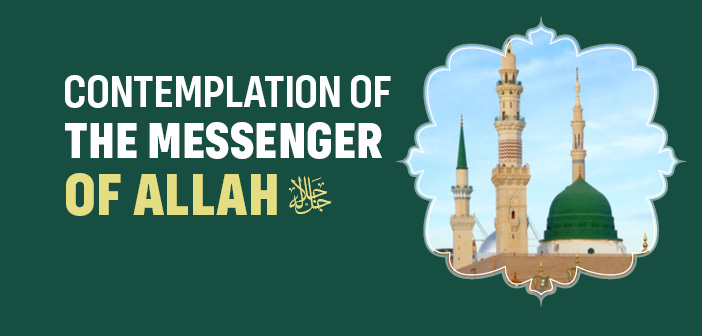The Messenger of Allah was in a state of constant contemplation. Here is the contemplation of our Prophet…
The Blessed Prophet –upon him blessings and peace- loved silence and contemplation. In the times just prior to his prophethood, he had grown even a more intense desire to retreat. He would remain for days on end in the Cave of Hira, approximately around 5 kilometers away from Mecca. His worship in these times of retreat was comprised of contemplation, gazing at the Kabah and reflecting on the treasures of the heavens and earth in the footsteps of his great ancestor Ibrahim –upon him peace-.[1] Through this manner, the Almighty was preparing him for his sacred mission.
The contemplation of the universe, its Creator and creation in which the Prophet –upon him blessings and peace- immersed himself during those days, did not cease for the remainder of his life.
Hind ibn Abi Hala –Allah be well-pleased with him- explains:
“The Messenger of Allah was in a continuous state of sorrow and thought. Comfort for him was irrelevant. He never spoke in vain. His silence was longer than his speech. He would always begin and end his talk by mentioning the name of Allah…” (Ibn Sa’d, I, 422-423)
To encourage Muslims to embark upon contemplation, The Prophet of Allah –upon him blessings and peace- has said:
“My Lord has commanded my silence to be of contemplation.” (İbrahim Canan, Hadis Ansiklopedisi, XVI, 252/5838)
“There is no worship like contemplation.” (Bayhakî, Shuab, IV, 157; Ali al-Muttaqî, XVI, 121)
“Be like wayfarers on this earth! Adopt mosques as homes! Accustom your hearts to sensitivity! Contemplate and cry in lots! Let not your desires of the ego change you!” (Ebû Nuaym, Hilye, I, 358)
The Blessed Prophet –upon him blessings and peace- again narrates from the ten leaves of Revelation given to Ibrahim –upon him peace-:
“An intelligent man ought to have certain hours: A portion of those hours ought to be spared for praying to and seeking from the Lord, another portion for contemplating the sublime art and power of the Almighty, another portion to reflect on what has been committed in the past and planning what to do in the future and another for earning a living in a manner permissible.” (Ebû Nuaym, Hilye, I, 167; İbn-i Esîr, el-Kâmil, I, 124)
Luqman –upon him peace- used to love sitting by himself in a secluded place to contemplate, something he frequently did. Upon being asked, “You keep to your self most of the time. Would not it be better if you mixed in with people and spoke with them?” Luqman –upon him peace- gave the following response:
“Remaining alone for long period of time is more suitable for contemplation. And remaining in contemplation for a long period of time is a guide that leads one to Paradise.”[2]
Abu’d-Darda –Allah be well-pleased with him- used to say:
“An hour of contemplation is superior to forty nights of supererogatory worship.” (Deylemî, II, 70-71, no: 2397, 2400)
Said ibn Musayyab, a prominent scholar of the Tabiun generation, was once asked which deed of worship held greater virtue.
“Contemplating the creation of Allah”, he replied, “and growing insightful into His religion.” (Bursevî, Rûhu’l-Bayân, [an-Nûr, 44])
Bishr ibn Khafiy used to emphasize the significance of contemplation in the following words:
“Had human beings properly contemplated the majesty of Allah, they would not have been able to rebel against him and commit sins.” (Ibn Kathir, I, 448, [Âl-i İmrân, 190])
As explained earlier, contemplation that leads one to an understanding of the majesty of Allah, glory unto Him, is an activity of reason. But it is the heart that culminates this activity in a perfect result. Since the heart is the noblest part of the body, it is only natural for its deeds to stand in greater worth than those carried out by other parts. The heart, after all, is the precinct of Divine Sight.
It remains an incontestable fact that a contemplation exerted by a reason trained under revelation is the first glimmer of the rays that enlighten the heart. It is the first and only means on the path that leads one to prudence and wisdom. Again, a contemplation of such caliber is a means to purge the heart from everything except for the Almighty (masiwallah) and thereby attain Divine Love.
The most beneficial of all contemplation is to reflect on Divine Majesty, Splendor and Sovereignty, by which one begins to think of ways of setting his or her life right and leaving all things detrimental to her or his eternal happiness.
Contemplating the blessings, commands, prohibitions, names and attributes of Allah, glory unto Him, flourishes love and wisdom in the heart and begins to elevate one spiritually. The thought of the Hereafter, its honor and eternality compared to the stage of test that is the life of the world increases desire for the life after and enables one to value the world only as much as is merited. One then realizes that the life of the world is but a sprint race from the mother’s womb to the grave. Grasping the fact that life is a precious asset for earning the bliss of eternity, allows the person to increase his solemnity and effort to render life more meaningful. He treats the time he has in his hands like treasure, making sure to make the most of it through good and beneficial deeds.
Abu’l-Hasan Harakani says it beautifully:
“At any given time, it is necessary for at least one limb of a Believer to be preoccupied with the remembrance of the Almighty. A Muslim ought to remember Allah either with the heart or the tongue, or see something the Almighty would like him to see, or do deeds of generosity with the hand, or visit people with his feet, or put his mind to service of fellow Muslims, or offer a prayer with an unwavering faith, or contemplate so as to attain wisdom, or do a sincere deed, or warn people of the adversities of Judgment Day.
Such a person will surely enter Paradise the moment he raises his head from the grave, dragging his shroud from behind him; of that I am his guarantor!”[3]
[1] Aynî, Umdatu’l-Qari, Beirut, I, 61; XXIV, 128.
[2] Imam Ghazzali, Ihya-u Ulumi’d-Din, Beirut1990, Daru’l-Khayr, VI, 45. The place inside a historical mosque in Tarsus where Luqman –upon him peace- retreated to itiqaf to contemplate is still visited today.
[3] Abu’l-Hasan Harakânî, Seyr ü Sülûk Risâlesi, prepared by Sadık Yalsızuçanlar, p. 107, Sufi Kitap, Istanbul, 2006.
Source: Osman Nuri Topbaş, Contemplation in Islam, Erkam Public.




